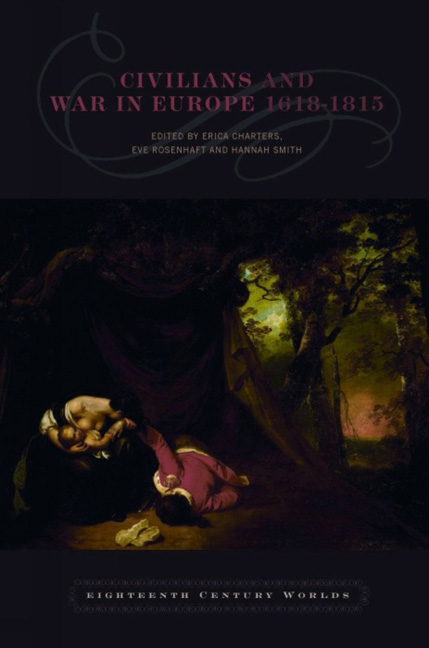Book contents
- Frontmatter
- Contents
- List of Contributors
- Acknowledgements
- List of Illustrations
- List of Abbreviations
- 1 Introduction
- Part I Suffering, Reconciliation and Values in the Seventeenth Century
- Part II The State, Soldiers and Civilians
- 6 The Administration of War and French Prisoners of War in Britain, 1756–1763
- 7 Civilians, the French Army and Military Justice during the Reign of Louis XIV, circa 1640–1715
- 8 Restricted Violence? Military Occupation during the Eighteenth Century
- 9 British Soldiers at Home: The Civilian Experience in Wartime, 1740–1783
- Part III Who is a Civilian? Who is a Soldier?
- Part IV Contradictions of the French Revolutionary and Napoleonic Wars
- Bibliography
- Index
6 - The Administration of War and French Prisoners of War in Britain, 1756–1763
from Part II - The State, Soldiers and Civilians
- Frontmatter
- Contents
- List of Contributors
- Acknowledgements
- List of Illustrations
- List of Abbreviations
- 1 Introduction
- Part I Suffering, Reconciliation and Values in the Seventeenth Century
- Part II The State, Soldiers and Civilians
- 6 The Administration of War and French Prisoners of War in Britain, 1756–1763
- 7 Civilians, the French Army and Military Justice during the Reign of Louis XIV, circa 1640–1715
- 8 Restricted Violence? Military Occupation during the Eighteenth Century
- 9 British Soldiers at Home: The Civilian Experience in Wartime, 1740–1783
- Part III Who is a Civilian? Who is a Soldier?
- Part IV Contradictions of the French Revolutionary and Napoleonic Wars
- Bibliography
- Index
Summary
THE INTIMATE relationship between warfare and political administration in early modern Europe has been extensively detailed through the debates regarding the military revolution. First outlined by Michael Roberts in 1955 and thoroughly expanded by Geoffrey Parker, the concept of the military revolution explains the growth of the armed forces during the early modern period, and fundamentally links it to the expansion of state power. While historians continue to debate the extent of this revolution, as well as its timing, geographical location and causality, its widespread influence demonstrates the energy of investigations into the relationship between war and the development of the early modern European state.
As noted in the general introduction, one of the main issues with which the concept of ‘total war’ is concerned is the extent of the mobilisation of state and society. In this respect, the administration of war is clearly relevant to the concept of total war. As Parker's thesis of the military revolution suggests, the development of the early modern state was the direct result of the demands of warfare. These demands led early modern states to devote a majority of their resources to war. By the same token, the administration of war provides various insights into the nature of civilian–military relations, the fundamental aspect of total war. A focus on the logistics of war and the management of state resources demonstrates how extensively the demands of war reached into early modern civil society. Yet the administration of war also demonstrates the inapplicability of ‘total war’ to the early modern period, as it collapses in on itself: the early modern European state was, by definition, concerned with war-making.
- Type
- Chapter
- Information
- Civilians and War in Europe 1618–1815 , pp. 87 - 99Publisher: Liverpool University PressPrint publication year: 2012

